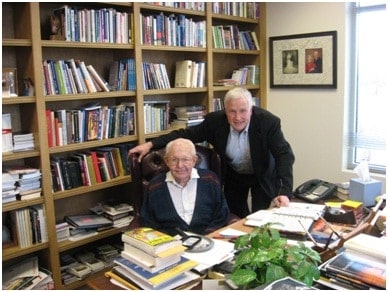
This past Sunday, September 12, 2010, our good friend Dr. Vernon Grounds went to be with the Lord at age 96. Dr. Grounds was a pastor, scholar, preacher, counselor, mentor and evangelical statesman who racked up over seventy years of ministry. He is survived by his dear wife Ann.
Not only was Grounds one of the founders of the evangelical movement, he served with distinction at Denver Seminary for over sixty years in positions ranging from academic dean, to president to president emeritus to chancellor.
Vernon Grounds had links with my own family on the East Coast. He was born in New Jersey in 1914. He knew all of my grandparents, including the ones who died before I was born! My mother remembers hearing Vernon speak in her youth group and teaching at her church for the Hawthorn Evening Bible School in Northern New Jersey.
He was always thoughtful, having a lifelong fascination with philosophers, psychologists and theologians. He himself traveled through a season of doubt and skepticism as a student. His faith was awakened in a youth revival on the East Coast in the late 1930s. From that time on, one of the themes of his life was the good news of God’s love in Jesus Christ. This shaped his own personality. For Dr. Grounds was characterized by a genuine humility and an authentic and gracious love for people.
While Vernon Grounds was a scholar, he was also an effective counselor, promoting the place of Christian counseling in the Evangelical world at a time when many dismissed it as a worldly enterprise. He took a pastoral interest in students, mentoring many, and was an encourager to local pastors like myself.
When I came to Denver twelve years ago, Dr. Grounds was one of the few people I knew. Along with my father, he spoke at my installation service at Cherry Creek Presbyterian Church. He was a regular source of wise advice. When Christina and I got stuck in our marriage, it was Dr. Grounds whom we turned to for help. He was an effective and fair listener, and with the Spirit’s wisdom could always point the way forward.
In the 1950s and early 60s, Vernon Grounds was one of the leaders of the new evangelical movement that emerged out of American Fundamentalism. Along with theologians like Carl F.H. Henry, he pointed out some of the blind spots in the Fundamentalist movement. Early on he made a clear case for the importance of social action and care for the poor (see his book Evangelicalism and Social Responsibility, 1969).
Grounds was a loving critic of fundamentalist Christianity. He would sometimes say that it was “too little fun, too much damn, and too little mental!” While he did not like being called a fundamentalist, and shied away from its separatistic tendencies, he was quick to insist that he was a fundamentalist theologically—in that he believed in the fundamental teachings of Christianity. He reminded students that Fundamentalism, in the original meaning of that term, was about the defense of the gospel in a life and death struggle with liberalism which denied the essential truths of the Bible.
But Grounds pointed out that in many quarters, fundamentalism had degenerated into bickering over incidentals. He said that its all too common legalistic Pharaisaism lacked a Calvary love. In a rather incisive critique written in Eternity magazine, entitled “Is Love in the Fundamentalist Creed?” Grounds said that the critical flaw of Fundamentalism was its lovelessness—an ungracious, sometimes negative and narrow outlook on life that seemed to undermine the gospel it defended. So he sought to build a seminary campus that represented a vibrant, yet Biblically rooted Evangelicalism, that was true to the gospel and marked by academic excellence, brotherly love and a social conscience. In so doing, he helped change the face of evangelical Christianity in America, even though some severely criticized him along the way for not being more militant and separatistic.
As an educator, Vernon Grounds repeatedly reminded seminary students that they could love God deeply by studying hard. We are to love the Lord with all our heart and with all our minds, he would say. Not only that, Dr. Grounds also emphasized that a Christian community, like the seminary, must be characterized by a brotherly love as reflected in the second great commandment to love our neighbors.
Vernon Grounds was a lifelong Baptist. Although early on he almost went to Westminster Theological Seminary, he enrolled instead at Faith Theological Seminary founded by Carl McIntire. Still, he took away a classical seminary education in the Reformed tradition. I can remember a few times when he would visit our church. He would tell me how much he loved the music and service and say something like, “well brother, almost thou hast persuadest me to become a Presbyterian!”
There are two things I most admire about Vernon Grounds. One is that he never retired from ministry. When he lived at the Meridian, he pastored that community. When he recently moved to Wichita he was looking forward to ministry opportunities there—at age 96! Dr. Grounds never stopped serving. He stayed active in a reading group to the end. He was also a good steward of his body—though often attributing his long life to the three G’s—God, genes and the gym (where he would work out).
The other thing I admire about Vernon Grounds is the legacy of faithfulness he has left for so many of us. He is another one of those Christians who have gone the distance with Christ. While he was all too human, and fallible, we are right to call him a godly man, because of this “long obedience in the same direction.”
Vernon Ground’s life story is recounted in the biography by Bruce Shelley, entitled, Transformed by Love: The Vernon Grounds Story (2002)
Thank you Vernon, for a life well lived. To God alone be the glory.
